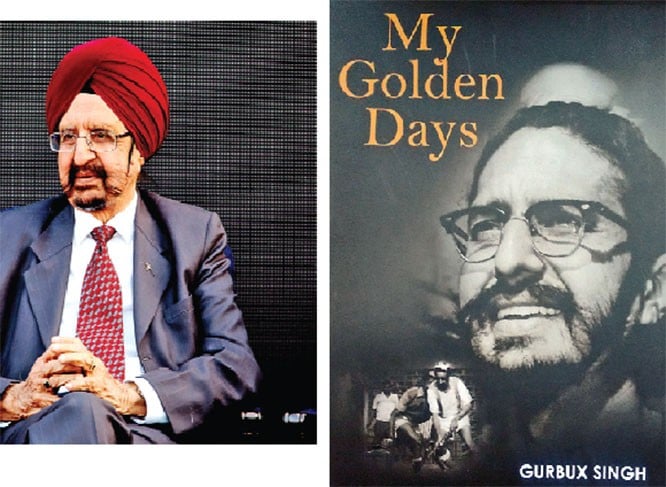
Gurbux Singh’s ‘My Golden Days’ is a wonderful read for all sports buff, not just for hockey lovers

Indian hockey great Gurbux Singh, Olympic gold medallist 1964, Asian Games gold medallist 1966 and co-captain 1968 Olympics (bronze medal) has come out with an interesting and beautifully penned autobiography.
A sportsman’s biography contributes to the history of the particular sport in that era and ‘My Golden Days’ is definitely one of them. A true star of his time, Gurbux was named the right full back in the World XI selected at the conclusion of the 1968 Olympics.
The tall, bespectacled Sikh was probably the only player on the international hockey circuit during his time who wore glasses. The very first chapter is titled ‘In Praise of Spectacles’ in which his own experience of playing with the glasses and people’s reactions to seeing a bespectacled hockey player in action are given.
The next chapter is about his most memorable day, the final of the 1964 Olympics, when India defeated Pakistan in the final to regain the Olympic gold, having lost the 1960 final to the same opponents after six consecutive golds. After the first two Chapters, it goes chronologically.
Born in 1935, Gurbux came from a family living in the Potohar region of Punjab and witnessed the riots of 1947 before the family crossed the newly created border to settle in what is now India.
As his father was an army man, the family changed stations every few years. The Punjabi started his serious hockey in Lucknow and later settled in Calcutta where he has been living for over six decades.
He proudly associates with Bengal throughout; he represented the state in the nationals a number of years.
A chapter is dedicated to his beloved city where all his five children were born.
First called for the national camp in 1959, he had to wait for more than two years before gaining the first cap for India. Apart from the two Olympics, Gurbux attended four others in different roles: media person (1972); coach of Indian team (1976); then after a long gap, in 1996 as TV commentator; and 2000 as a spectator. From the 1972 Olympics, he describes the two incidents which are still frequently recalled. One was the Palestinians’ attack on the Israeli contingent in the Olympics Village. The other was the silver medal winning Pakistan team’s "misbehaviour" during the medal ceremony which resulted in a ban on the entire Pakistan team.
After his playing career, Gurbux became an international umpire and whistled at the 1982 Asiad.
Later, he served as a national selector for three spells, the last in 2003-08. He coached the French national team and was offered citizenship of that country.
Politics plague sports in the subcontinent. A number of incidents of infighting and bickering among players, team officials and national body’s office bearers are mentioned in the book.
The 1968 Olympics saw the most bizarre arrangement: the Indian team had two "joint" captains, Gurbux himself and Prithipal Singh. The background is fully explained. Not surprisingly, the favourites India, the reigning Olympics and Asian Champions, failed to reach the final for the first time, "so even with the bronze in our bag, we had to return home quietly, faces hidden in disappointment, heads lowered in shame". That was also his swansong; a far cry from 1964 when there were victory parades.
He faced humiliation also at the 1976 Olympics when he coached the Indian side. They failed to qualify for the semi-finals for the first time. Consequently, Gurbux had to appear before a parliamentary committee.
But cricket saved him as everyone was listening to the commentary of the Test match going on between India and England.
One chapter has tributes to the players Gurbux admired, not only his contemporaries but also from the early and following eras. The Indian players get more space for obvious reason with as many as three pages only for Dhyan Chand; the greatest of them all.
The non-Indians including many Pakistanis, however, do get compliments in the shape of brief but succinct comments.
There is also praise for the notable administrators including the present FIH president, Narinder Batra from India.
Gurbux’s father was his mentor. One chapter has elder Singh’s letters to his son. These letters are sort of guidelines about various aspects of one’s life.
The Indo-Pak rivalry in hockey was at its peak in his day -- the two countries faced each other in the finals. The rivalry was not confined to the physical altercations during the game. It extended off the field; even to the dining hall of the Olympic village.
There were personal battles too. At the 1964 Olympics final, he was assigned to keep a check on Pakistan’s legendary right winger Khalid Mahmood, who was incidentally born in the village just 10 km from Gurbux’s ancestral place in Chakwal.
The book has a number of fascinating anecdotes. One really captivated this scribe. For the 1983 Champions Trophy in Karachi, Gurbux was the manager of the Indian team. On their way back, the Indians had a stopover in Lahore en route to Delhi. At the farewell dinner, on Gurbux’s request, Pakistan president General Zia-ul-Haq arranged a visit of Sikh players to Nankana Sahib, the Sikhs’ holy place, not far from Lahore.
The General is quoted as saying, "Gurbux Ji, adha suwab toheda te adha suwab mera (meaning half the blessings will be for you and half for me)."
There are forewords by Indian cricket legend Bishan Bedi and hockey great Keshav Dutt, the double Olympic gold medallist.
The book is in the coffee table design with picture(s) at almost every page (total 232 pages), including a number of full-page pics.
‘My Golden Days’ is a wonderful read for any sports buff, not just for hockey lovers.